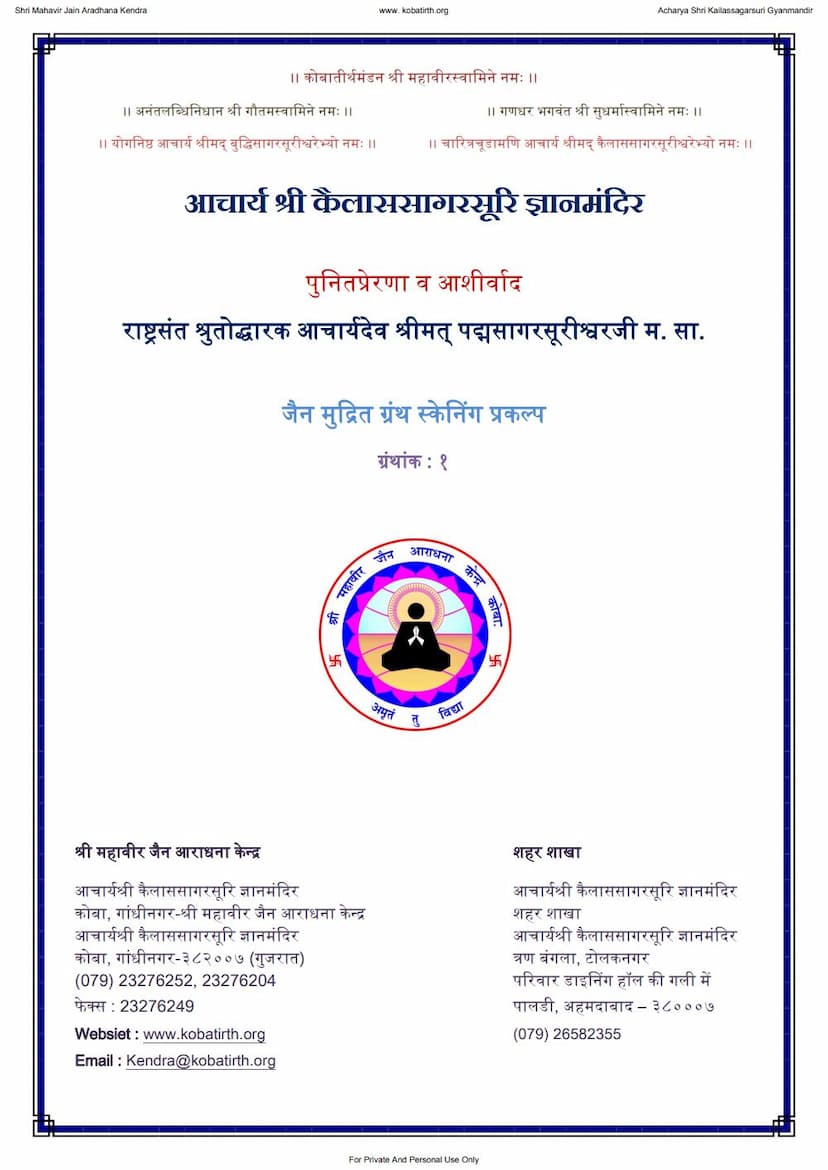Smruti Tattvasya Part 01
Added to library: September 2, 2025

Summary
This document is a comprehensive summary of the Jain text "Smruti Tattvasya Part 01" by Raghunandan Bhattacharya. The book, published by Jivanand Vidyasagar, is a detailed exploration of various principles and practices, primarily focused on the concept of 'Tattva' (principles) within the Jain tradition.
The summary covers the following key areas as presented in the table of contents and the initial pages of the text:
Core Principles Explored:
- Tithi Tattva (Principle of Lunar Days): This section delves into the nuances of lunar days, including their nature, special considerations for conflicting or incomplete tithis, the importance of birth tithis, and the timings for various rituals and observances based on tithis. It also discusses fasting periods and the calculation of specific times for religious acts.
- Shraddha Tattva (Principle of Offerings to Ancestors): This part of the text focuses on the rituals and principles related to honoring ancestors. It covers the appropriate locations, the deities or beings to be invoked, seating arrangements, the use of sacred grass (darbha), ancestral lineages, offerings, and the specific times and methods for performing these rites.
- Aahnik Tattva (Principle of Daily Observances): This section outlines the daily routines and duties expected of an individual. It details practices related to purification, hygiene, specific actions to be performed during different parts of the day and night, and the rituals associated with meditation and worship. It also touches upon dietary principles and the qualities of various foods.
- Prayashchitta Tattva (Principle of Penance and Expiation): This is a significant portion of the text, dedicated to understanding and rectifying wrongdoings. It defines penance, discusses various types of transgressions and their corresponding expiations, the effects of performing penance for different sins, the significance of the Ganges, and the specific penances for various offenses, including those related to the cow, theft, and impurity.
- Jyotisha Tattva (Principle of Astrology): This section introduces astrological concepts, including the meaning of astrological terms, the analysis of planetary influences, remedies for celestial afflictions, and the significance of specific conjunctions and calculations related to time, marriage, and life events. It also covers topics like planetary predictions, auspicious and inauspicious yogas, and their impact on individuals.
- Malamaasa Tattva (Principle of the Intercalary Month): This part explains the concept of an extra month in the Hindu lunar calendar, its specific rules, and the prohibitions and observances associated with it, particularly concerning marriages and other significant life events.
- Samskara Tattva (Principle of Life Cycle Rituals): This section covers the various samskaras (sacraments or rites of passage) observed throughout a person's life, from conception and birth to the final rites. It details the procedures, timings, and significance of these rituals. It also includes information on the rituals associated with house-building and other life events.
Key Themes and Concepts:
The text emphasizes the importance of:
- Observing Religious Duties: Adhering to daily observances, tithis, and ancestral rites is crucial for spiritual progress.
- Purification and Righteous Conduct: Maintaining physical and spiritual purity is highlighted, along with the need for ethical behavior.
- Penance and Redemption: The text provides a detailed framework for understanding and performing penance to purify oneself from sins.
- Astrology and Time: The influence of celestial bodies and auspicious timings is considered vital for various activities.
- Life Cycle Rituals: The samskaras are presented as essential for sanctifying life stages and ensuring well-being.
- Respect for Ancestors: The importance of Shraddha rituals for honoring and appeasing ancestors is a recurring theme.
The book appears to be a foundational text that guides practitioners on the correct performance of rituals, understanding of cosmic principles, and ethical conduct within the Jain framework, drawing heavily on scriptures and established traditions. The detailed breakdown of each Tattva suggests a highly systematic and philosophical approach to Jain practice and belief.